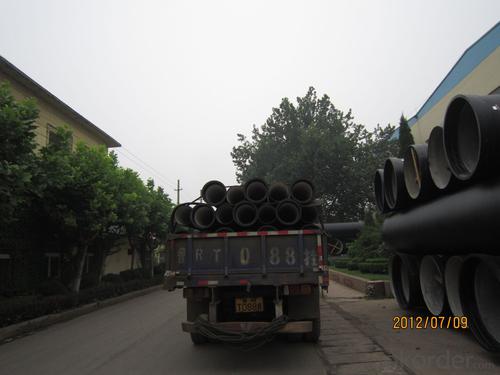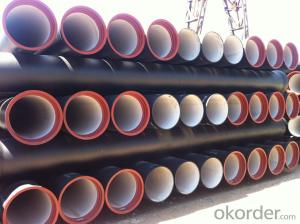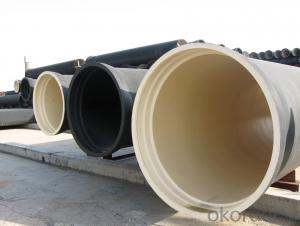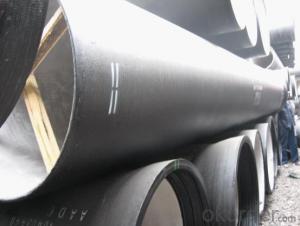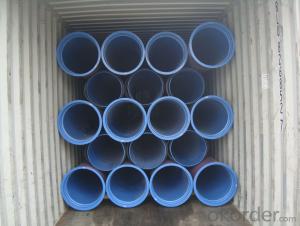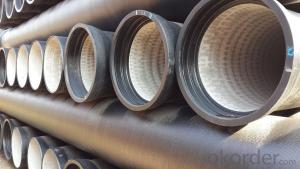T Type Ductile Iron Pipe DN500
- Loading Port:
- China Main Port
- Payment Terms:
- TT or LC
- Min Order Qty:
- 20 m.t.
- Supply Capability:
- -
OKorder Service Pledge
OKorder Financial Service
You Might Also Like
1) The standard of pipe: ISO2531:1998, EN545:2006,K9 K8
2) Effective length: 6m/5.7m
3) Inner cement line: Portland cement lineas per ISO4179
4) Zinc coating: at least 130g/m2 as per ISO8179
5) Bitumen painting: at least 70μm as per ISO8179
6)With 102% quantity of NBR, SBR, or EPDM ring asper ISO4633
7) DN80-DN1200
8) Highstrength, lighter than grey iron, good corrosion resistance, no furring, smallflow resistance, easy fixing, long life tome about 100 yeas
9)Checked by automatic inspection equipment
10) Composition:
Chemical composition | |||
Chemical composition | Ductile Cast Iron Pipe (%) | Grey iron pipe (%) | Steel pipe (%) |
C | 3.5-4.0 | 3.2-3.8 | 0.1-0.2 |
Si | 1.9-2.6 | 1.4-2.2 | 0.15-0.4 |
Mn | 0.15-0.45 | 0.4-0.6 | 0.3-0.6 |
P | ≤0.06 | ≤0.3 | 0.02-0.03 |
S | ≤0.02 | ≤0.1 | 0.02-0.03 |
Mg | 0.03-0.06 |
|
|
11) Feature:
Mechanical properties | |||
| Ductile Cast Iron Pipe | Grey Iron Pipe | Steel Pipe |
Tensile Strength(Mpa) | ≥420 | 150-260 | ≥400 |
Yield Strength(Mpa) | ≥300 | No Confirmation | No Confirmation |
Bending Strength(Mpa) | ≥590 | 200-360 | ≥400 |
Elongation (%) | ≥10 | Neglected | ≥18 |
Brinell Hardness(HBS) | ≤230 | ≤230 | About 140 |
12) T type mechanical joint
13) Packing: in bulk or container
PACKING: 1) Pipesare bundled together with the steel belt.
2) Wooden pieces are put between the pipes.
With good finish, high corrosion resistance and pressure-withstanding capacity.
- Q: Ductile iron pipe joint damage, water leakage, want to see the connection with other pipe fittings, how to operate?!
- The ductile iron pipe can be used as the plugging device for the big part
- Q: How do ductile iron pipes compare to PVC pipes in terms of strength?
- Ductile iron pipes are generally stronger than PVC pipes in terms of their ability to withstand external loads and pressure. Ductile iron has a higher tensile strength and can handle higher operating pressures, making it suitable for a wider range of applications, including underground and high-pressure systems. PVC pipes, on the other hand, have lower tensile strength and are more prone to cracking or bursting under high pressure or when exposed to extreme temperatures. However, PVC pipes are lighter and easier to handle, making them more convenient for installation and maintenance in certain situations.
- Q: What is the acceptance of cast iron pipe material?
- According to the casting method, it is divided into continuous cast iron pipe and centrifugal cast iron pipe, in which the centrifugal cast iron pipe is divided into sand mould and metal type two kinds. Divided into gray cast iron pipe and nodular cast iron pipe according to different material.
- Q: What is the average weight of ductile iron pipes?
- The weight of ductile iron pipes can differ based on their specific dimensions and specifications. However, as a general rule, the weight of ductile iron pipes usually falls within the range of 50 to 200 pounds per foot. Various factors, including the pipe's diameter, wall thickness, and length, affect its weight. It is essential to understand that these weights are averages, and the actual weight of a particular ductile iron pipe may differ. To accurately determine the weight of a ductile iron pipe, it is recommended to consult the manufacturer's specifications or engineering guidelines.
- Q: Can ductile iron pipes be used for pressure reducing stations?
- Yes, ductile iron pipes can be used for pressure reducing stations. Ductile iron pipes have high strength and durability, making them suitable for handling high-pressure systems. Additionally, their corrosion resistance properties make them a reliable choice for long-term use in pressure reducing stations.
- Q: Are ductile iron pipes suitable for use in saltwater environments?
- Yes, ductile iron pipes are suitable for use in saltwater environments. Ductile iron is highly resistant to corrosion and can withstand the corrosive effects of saltwater, making it a reliable choice for piping systems in such environments.
- Q: Are ductile iron pipes suitable for trenchless pipe bursting methods?
- Indeed, ductile iron pipes prove to be an appropriate choice for trenchless pipe bursting techniques. Displaying exceptional strength and durability, ductile iron emerges as a material capable of enduring the formidable forces implicated in the pipe bursting procedure. Its remarkable tensile strength safeguards against the occurrence of cracks or fractures during the bursting process. Moreover, the inner surface of these pipes boasts a smooth texture, which facilitates the efficient flow of fluids such as water. The aforementioned smoothness further diminishes the odds of encountering blockages or accumulation within the pipe. All things considered, ductile iron pipes represent a dependable alternative for trenchless pipe bursting methods.
- Q: Can ductile iron pipes be used for gravity flow applications?
- Ductile iron pipes are suitable and widely used for gravity flow applications. Renowned for their strength, durability, and flexibility, these pipes are perfect for a variety of uses, such as gravity flow systems. They are commonly employed in water and wastewater systems, storm drainage systems, and other applications that necessitate resistance to high internal and external pressures. The pipes possess the capability to bear the weight of the flowing fluid without any supplemental support, which makes them a dependable choice for gravity flow applications. Furthermore, their ability to resist corrosion ensures long-term performance in both underground and exposed environments. In conclusion, ductile iron pipes are an excellent option for gravity flow applications.
- Q: Are ductile iron pipes suitable for potable water systems?
- Yes, ductile iron pipes are suitable for potable water systems. Ductile iron is a strong and durable material that is resistant to corrosion, making it a reliable choice for transporting drinking water. Additionally, ductile iron pipes have been widely used in potable water systems for many years, proving their suitability and effectiveness.
- Q: How do ductile iron pipes perform in freeze-thaw cycles?
- Ductile iron pipes demonstrate exceptional performance in freeze-thaw cycles due to their material properties. With high tensile strength and excellent impact resistance, ductile iron is highly resistant to the stresses caused by freezing and thawing. Unlike other materials, these pipes can withstand the expansion and contraction during temperature changes without cracking or breaking. One of the primary reasons for the success of ductile iron pipes in freeze-thaw conditions is their capacity to absorb and dissipate stresses. The material's high ductility allows for slight deformation under stress, releasing pressure and preventing pipe damage. This characteristic ensures that the pipes can endure repeated freezing and thawing cycles without compromising their structural integrity. Furthermore, ductile iron pipes feature a durable and protective coating, such as cement mortar lining or polyethylene encasement, which further enhances their resistance to freeze-thaw cycles. These coatings offer an extra layer of protection, preventing direct contact between water and the iron and reducing the risk of corrosion. Moreover, ductile iron pipes have an extended service life, often exceeding 100 years, thanks to their inherent strength and resistance to various environmental factors, including freeze-thaw cycles. The pipes' ability to endure these cycles without significant damage ensures the reliability and durability of water distribution systems, even in regions prone to freezing temperatures. In conclusion, ductile iron pipes are highly dependable and excel in freeze-thaw cycles. Their high tensile strength, impact resistance, capacity to absorb stresses, and protective coatings make them the preferred choice for water distribution systems in areas with harsh winter conditions.
Send your message to us
T Type Ductile Iron Pipe DN500
- Loading Port:
- China Main Port
- Payment Terms:
- TT or LC
- Min Order Qty:
- 20 m.t.
- Supply Capability:
- -
OKorder Service Pledge
OKorder Financial Service
Similar products
Hot products
Hot Searches
Related keywords


